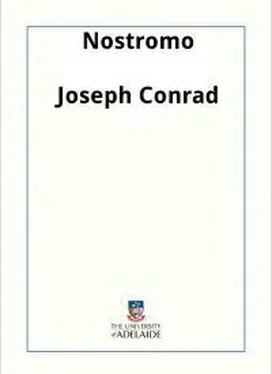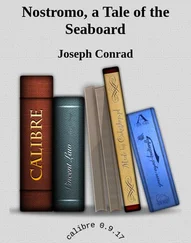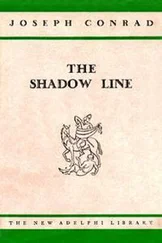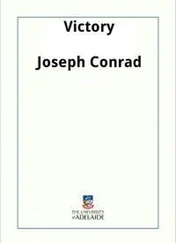Джозеф Конрад - Nostromo - A Tale of the Seaboard
Здесь есть возможность читать онлайн «Джозеф Конрад - Nostromo - A Tale of the Seaboard» весь текст электронной книги совершенно бесплатно (целиком полную версию без сокращений). В некоторых случаях можно слушать аудио, скачать через торрент в формате fb2 и присутствует краткое содержание. Год выпуска: 2006, Жанр: Классическая проза, на английском языке. Описание произведения, (предисловие) а так же отзывы посетителей доступны на портале библиотеки ЛибКат.
- Название:Nostromo: A Tale of the Seaboard
- Автор:
- Жанр:
- Год:2006
- ISBN:нет данных
- Рейтинг книги:4 / 5. Голосов: 1
-
Избранное:Добавить в избранное
- Отзывы:
-
Ваша оценка:
- 80
- 1
- 2
- 3
- 4
- 5
Nostromo: A Tale of the Seaboard: краткое содержание, описание и аннотация
Предлагаем к чтению аннотацию, описание, краткое содержание или предисловие (зависит от того, что написал сам автор книги «Nostromo: A Tale of the Seaboard»). Если вы не нашли необходимую информацию о книге — напишите в комментариях, мы постараемся отыскать её.
Nostromo: A Tale of the Seaboard — читать онлайн бесплатно полную книгу (весь текст) целиком
Ниже представлен текст книги, разбитый по страницам. Система сохранения места последней прочитанной страницы, позволяет с удобством читать онлайн бесплатно книгу «Nostromo: A Tale of the Seaboard», без необходимости каждый раз заново искать на чём Вы остановились. Поставьте закладку, и сможете в любой момент перейти на страницу, на которой закончили чтение.
Интервал:
Закладка:
But, as if by a refinement of cruelty, Dr. Monygham was left for months to decay slowly in the darkness of his grave-like prison. It was no doubt hoped that it would finish him off without the trouble of an execution; but Dr. Monygham had an iron constitution. It was Guzman Bento who died, not by the knife thrust of a conspirator, but from a stroke of apoplexy, and Dr. Monygham was liberated hastily. His fetters were struck off by the light of a candle, which, after months of gloom, hurt his eyes so much that he had to cover his face with his hands. He was raised up. His heart was beating violently with the fear of this liberty. When he tried to walk the extraordinary lightness of his feet made him giddy, and he fell down. Two sticks were thrust into his hands, and he was pushed out of the passage. It was dusk; candles glimmered already in the windows of the officers’ quarters round the courtyard; but the twilight sky dazed him by its enormous and overwhelming brilliance. A thin poncho hung over his naked, bony shoulders; the rags of his trousers came down no lower than his knees; an eighteen months’ growth of hair fell in dirty grey locks on each side of his sharp cheek-bones. As he dragged himself past the guard-room door, one of the soldiers, lolling outside, moved by some obscure impulse, leaped forward with a strange laugh and rammed a broken old straw hat on his head. And Dr. Monygham, after having tottered, continued on his way. He advanced one stick, then one maimed foot, then the other stick; the other foot followed only a very short distance along the ground, toilfully, as though it were almost too heavy to be moved at all; and yet his legs under the hanging angles of the poncho appeared no thicker than the two sticks in his hands. A ceaseless trembling agitated his bent body, all his wasted limbs, his bony head, the conical, ragged crown of the sombrero, whose ample flat rim rested on his shoulders.
In such conditions of manner and attire did Dr. Monygham go forth to take possession of his liberty. And these conditions seemed to bind him indissolubly to the land of Costaguana like an awful procedure of naturalization, involving him deep in the national life, far deeper than any amount of success and honour could have done. They did away with his Europeanism; for Dr. Monygham had made himself an ideal conception of his disgrace. It was a conception eminently fit and proper for an officer and a gentleman. Dr. Monygham, before he went out to Costaguana, had been surgeon in one of Her Majesty’s regiments of foot. It was a conception which took no account of physiological facts or reasonable arguments; but it was not stupid for all that. It was simple. A rule of conduct resting mainly on severe rejections is necessarily simple. Dr. Monygham’s view of what it behoved him to do was severe; it was an ideal view, in so much that it was the imaginative exaggeration of a correct feeling. It was also, in its force, influence, and persistency, the view of an eminently loyal nature.
There was a great fund of loyalty in Dr. Monygham’s nature. He had settled it all on Mrs. Gould’s head. He believed her worthy of every devotion. At the bottom of his heart he felt an angry uneasiness before the prosperity of the San Tome mine, because its growth was robbing her of all peace of mind. Costaguana was no place for a woman of that kind. What could Charles Gould have been thinking of when he brought her out there! It was outrageous! And the doctor had watched the course of events with a grim and distant reserve which, he imagined, his lamentable history imposed upon him.
Loyalty to Mrs. Gould could not, however, leave out of account the safety of her husband. The doctor had contrived to be in town at the critical time because he mistrusted Charles Gould. He considered him hopelessly infected with the madness of revolutions. That is why he hobbled in distress in the drawing-room of the Casa Gould on that morning, exclaiming, “Decoud, Decoud!” in a tone of mournful irritation.
Mrs. Gould, her colour heightened, and with glistening eyes, looked straight before her at the sudden enormity of that disaster. The finger-tips on one hand rested lightly on a low little table by her side, and the arm trembled right up to the shoulder. The sun, which looks late upon Sulaco, issuing in all the fulness of its power high up on the sky from behind the dazzling snow-edge of Higuerota, had precipitated the delicate, smooth, pearly greyness of light, in which the town lies steeped during the early hours, into sharp-cut masses of black shade and spaces of hot, blinding glare. Three long rectangles of sunshine fell through the windows of the sala; while just across the street the front of the Avellanos’s house appeared very sombre in its own shadow seen through the flood of light.
A voice said at the door, “What of Decoud?”
It was Charles Gould. They had not heard him coming along the corredor. His glance just glided over his wife and struck full at the doctor.
“You have brought some news, doctor?”
Dr. Monygham blurted it all out at once, in the rough. For some time after he had done, the Administrador of the San Tome mine remained looking at him without a word. Mrs. Gould sank into a low chair with her hands lying on her lap. A silence reigned between those three motionless persons. Then Charles Gould spoke—
“You must want some breakfast.”
He stood aside to let his wife pass first. She caught up her husband’s hand and pressed it as she went out, raising her handkerchief to her eyes. The sight of her husband had brought Antonia’s position to her mind, and she could not contain her tears at the thought of the poor girl. When she rejoined the two men in the diningroom after having bathed her face, Charles Gould was saying to the doctor across the table—
“No, there does not seem any room for doubt.”
And the doctor assented.
“No, I don’t see myself how we could question that wretched Hirsch’s tale. It’s only too true, I fear.”
She sat down desolately at the head of the table and looked from one to the other. The two men, without absolutely turning their heads away, tried to avoid her glance. The doctor even made a show of being hungry; he seized his knife and fork, and began to eat with emphasis, as if on the stage. Charles Gould made no pretence of the sort; with his elbows raised squarely, he twisted both ends of his flaming moustaches—they were so long that his hands were quite away from his face.
“I am not surprised,” he muttered, abandoning his moustaches and throwing one arm over the back of his chair. His face was calm with that immobility of expression which betrays the intensity of a mental struggle. He felt that this accident had brought to a point all the consequences involved in his line of conduct, with its conscious and subconscious intentions. There must be an end now of this silent reserve, of that air of impenetrability behind which he had been safeguarding his dignity. It was the least ignoble form of dissembling forced upon him by that parody of civilized institutions which offended his intelligence, his uprightness, and his sense of right. He was like his father. He had no ironic eye. He was not amused at the absurdities that prevail in this world. They hurt him in his innate gravity. He felt that the miserable death of that poor Decoud took from him his inaccessible position of a force in the background. It committed him openly unless he wished to throw up the game—and that was impossible. The material interests required from him the sacrifice of his aloofness—perhaps his own safety too. And he reflected that Decoud’s separationist plan had not gone to the bottom with the lost silver.
The only thing that was not changed was his position towards Mr. Holroyd. The head of silver and steel interests had entered into Costaguana affairs with a sort of passion. Costaguana had become necessary to his existence; in the San Tome mine he had found the imaginative satisfaction which other minds would get from drama, from art, or from a risky and fascinating sport. It was a special form of the great man’s extravagance, sanctioned by a moral intention, big enough to flatter his vanity. Even in this aberration of his genius he served the progress of the world. Charles Gould felt sure of being understood with precision and judged with the indulgence of their common passion. Nothing now could surprise or startle this great man. And Charles Gould imagined himself writing a letter to San Francisco in some such words: “. . . . The men at the head of the movement are dead or have fled; the civil organization of the province is at an end for the present; the Blanco party in Sulaco has collapsed inexcusably, but in the characteristic manner of this country. But Barrios, untouched in Cayta, remains still available. I am forced to take up openly the plan of a provincial revolution as the only way of placing the enormous material interests involved in the prosperity and peace of Sulaco in a position of permanent safety. . . .” That was clear. He saw these words as if written in letters of fire upon the wall at which he was gazing abstractedly.
Читать дальшеИнтервал:
Закладка:
Похожие книги на «Nostromo: A Tale of the Seaboard»
Представляем Вашему вниманию похожие книги на «Nostromo: A Tale of the Seaboard» списком для выбора. Мы отобрали схожую по названию и смыслу литературу в надежде предоставить читателям больше вариантов отыскать новые, интересные, ещё непрочитанные произведения.
Обсуждение, отзывы о книге «Nostromo: A Tale of the Seaboard» и просто собственные мнения читателей. Оставьте ваши комментарии, напишите, что Вы думаете о произведении, его смысле или главных героях. Укажите что конкретно понравилось, а что нет, и почему Вы так считаете.












